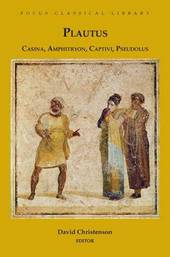
|
Casina, Amphitryon, Captivi, Pseudolus: Four Plays
Paperback / softback
Main Details
| Title |
Casina, Amphitryon, Captivi, Pseudolus: Four Plays
|
| Authors and Contributors |
By (author) Plautus
|
|
Edited and translated by David Christenson
|
| Physical Properties |
| Format:Paperback / softback | | Pages:272 | | Dimensions(mm): Height 229,Width 153 |
|
| Category/Genre | Plays, playscripts |
|---|
| ISBN/Barcode |
9781585101559
|
| Classifications | Dewey:872.01 |
|---|
| Audience | | Tertiary Education (US: College) | |
|---|
|
Publishing Details |
| Publisher |
Focus Publishing/R Pullins & Co
|
| Imprint |
Focus Publishing/R Pullins & Co
|
| Publication Date |
1 February 2008 |
| Publication Country |
United States
|
Description
This anthology contains English translations of four plays by one of the best practitioners of Roman comedy, Plautus. The plays Casina, Amphitryon, Captivi and Pseudolus provide an introduction to the world of Roman comedy. As with all Focus translations, the emphasis is on a handsomely produced, inexpensive, readable edition that is close to the original, with an extensive introduction, notes and appendices.
Author Biography
David Christenson (Ph.D. Harvard University) is Associate Professor of Classics at the University of Arizona. He is the author of several books including "Roman Comedy: Five Plays by Plautus and Terence" and "Plautus: Casina, Amphitryon, Captivi, Pseudolus," both for Focus Publishing. In 2011-12, he will be a Loeb Classical Library Foundation Fellow.
ReviewsChristenson has offered readers a useful and informative edition of four Plautine plays in neutral, accessible English that, unlike some recent Plautus translations, reaches out to a wide modern audience, both classicist and general, both in Anglophone countries and elsewhere in the world. Within the range of Plautus translations as currently available, this is certainly a most welcome contribution. Christenson's thematical focus on some of Plautus' more serious plays, in which he seems almost like a social critic, is interesting and provides food for thought. - Vincent Hunink, Bryn Mawr Classical Review 2009.07.03
|